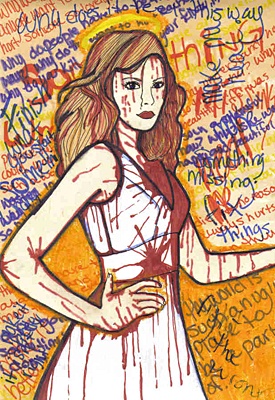All Nonfiction
- Bullying
- Books
- Academic
- Author Interviews
- Celebrity interviews
- College Articles
- College Essays
- Educator of the Year
- Heroes
- Interviews
- Memoir
- Personal Experience
- Sports
- Travel & Culture
All Opinions
- Bullying
- Current Events / Politics
- Discrimination
- Drugs / Alcohol / Smoking
- Entertainment / Celebrities
- Environment
- Love / Relationships
- Movies / Music / TV
- Pop Culture / Trends
- School / College
- Social Issues / Civics
- Spirituality / Religion
- Sports / Hobbies
All Hot Topics
- Bullying
- Community Service
- Environment
- Health
- Letters to the Editor
- Pride & Prejudice
- What Matters
- Back
Summer Guide
- Program Links
- Program Reviews
- Back
College Guide
- College Links
- College Reviews
- College Essays
- College Articles
- Back
Society? Misconceptions About Feminism
It needs a new name. Feminism apparently is not inclusive enough for today’s society; it has a bad reputation. So let’s just call it common sense, because that’s exactly what it is. People are unclear about what being feminist means. People are standoffish when asked the question, “do you consider yourself a feminist? Why or why not?” The article by Amy Butcher, entitled “Emoji Feminism,” speaks on women-specific stereotypes that have been enhanced thanks to technology. Butcher writes of the many emoji faces and animals that she saw on her phone, yet she could not seem to find the emoji that represented herself, “Where was the lawyer? The accountant? The surgeon? How was there space for both a bento box and a single fried coconut shrimp, and yet women were restricted to a smattering of tired, beauty-centric roles?” (Butcher par 9). This is where Feminism comes into play. Feminism, the fight for equality. Beauty-centric roles do not necessarily support the all-inclusive image of what a woman is and of what she is capable. Feminism is the advocacy of women's rights based on the equality of the sexes. That does not mean women are trying to overpower men; it simply means women are attempting to be on an equal plane. From time immemorial there have been humanly inclusive problems, whether it be race, gender or religion, etc. Sandra Harding’s book, “The Science Question in Feminism” reveals the distinct difference between sex and gender. These words paint pictures in the mind that can alter a person's perspective, and are often used incorrectly, but to be succinct “ I refer to ‘gender roles’ rather than ‘sex roles,’ etc., retaining only a few terms such as ‘sexism´, where the substitution seems more distracting than useful. Otherwise (except in direct quotations), I use ‘sex’ only when it is indeed, biology that is at issue” (Harding 15). Any gender can be feminist. The idea is equality for all. The oppression of women is what created the name “feminism.” Each and every one of us must understand that there are struggles that women face that we may not personally understand or relate to, but we stand with those women against their oppression. Together, as a people of equality, we define Feminism. Now more than ever, we stand together to support all people, all women. Black women, gay women, trans women, Latina women, white women, all women; hand in hand, heart to heart with as much passion and drive as we would have for our survival because oppression against one is oppression against all. We must stand together in solidarity to effect change.

Similar Articles
JOIN THE DISCUSSION
This article has 0 comments.

This was written a few months ago, just after the national Women's March.
Here are two sources that I used in my piece:
Butcher, Amy. “Emoji Feminism.” The New York Times. 11 March, 2016.
Harding, Sandra. The Science Question in Feminism. Cornell University and Press, 1986.